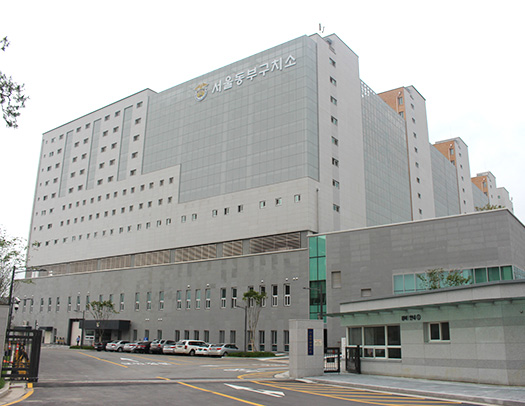Over 1,000 Covid-19 cases at the Dongbu Detention Center pointed to the need to improve correctional facilities' environmental conditions, human rights activists said.
A total of 1,161 prisoners and detainees at the detention center were confirmed with Covid-19 as of Wednesday since the first case was reported on Nov. 27. The health authorities have run Covid-19 testing for all people at the prison six times so far.

The cluster infection was inevitable because the Dongbu Detention Center did not have any extra space to isolate Covid-19 patients and those who contacted them. When the authorities conducted all inspection and confirmed the cluster infection on Dec. 19, the detention center operated at 116.7 percent capacity.
Kim Jae-sool, director of the Ministry of Justice's healthcare division, said that over 50 percent of confirmed patients at the detention center were assumed to have contracted the virus through close contact with other inmates.
The justice ministry has transferred 972 inmates from the Dongbu Detention Center to other prisons in five steps until Tuesday and reduced the capacity to 64 percent.
On Jan. 2, the ministry placed 222 inmates who had close contact with Covid-19 patients in single rooms to prevent additional viral spreads.
Despite the countermeasures, the government came under fire for failing to do more than just isolating Covid-19 confirmed detainees. Unless the government tackles the chronic problem of poor health and prison overcrowding, a large-scale group infection may keep occurring at other correctional facilities, experts said.
The National Human Rights Commission of Korea released a statement on Wednesday, pushing the government to devise measures to enhance prisoners’ accessibility to healthcare service.
“Only by quarantine in correctional facilities, not medical facilities, it is difficult to ensure adequate healthcare services for inmates as set by Article 44 of the Infectious Disease Prevention Act,” NHRC said. “Inmates must also have access to the universal standards of medical services, including emergency and specialized care, and the health authorities’ medical system must manage their health.”
NHRC urged correctional facilities to build an active cooperation system with the KDCA.
“They should seek swift and detailed measures to reduce overcrowding of correctional facilities and expand the healthcare system, and ask for active cooperation from economic and judicial authorities,” it said.
The Korean Confederation Medical Activist Groups for Health Rights issued a statement. They criticized that the justice ministry and correctional service authorities did not conduct a proper epidemiological study in the cluster infection's initial stage at the Dongbu Detention Center.
“The incident at the detention center occurred because the government’s measure discriminated against the human rights of inmates,” the activist group said. It claimed that the justice ministry and the correctional authorities’ epidemiological investigations and quarantine were not as thorough as those for the general public.
“The first confirmed case came out at the end of November, but there was no full inspection for three weeks, and they only focused on isolating the facility. Also, they all mixed up non-contacts, contacts, and confirmed cases,” the group said.
The group urged the government to set plans to solve the overcrowding problem and address the discrimination against inmates in healthcare services.
“Before promoting K-quarantine success or New Deal policy, the government should serve its minimal duty towards people in ‘low places’,” it said.
A group of lawyers also said on Monday that the justice ministry’s failure to prevent infections at the Dongbu detention center and inactive response to the cluster infection there violated inmates’ rights to life and health.

